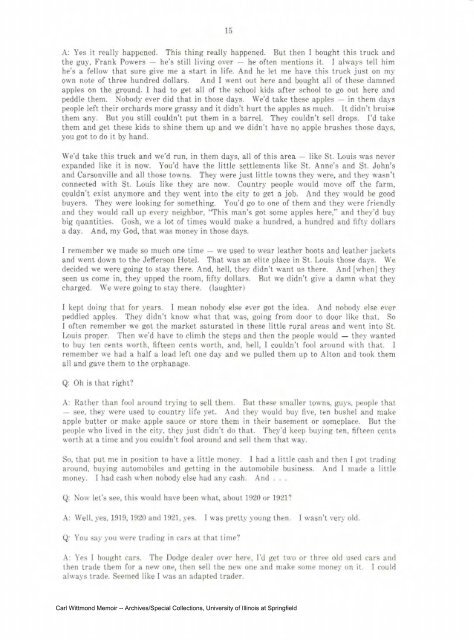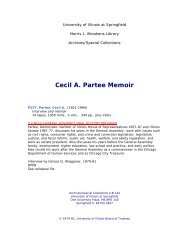Archives/Special Collections, University of Illinois at Springfield
Archives/Special Collections, University of Illinois at Springfield
Archives/Special Collections, University of Illinois at Springfield
You also want an ePaper? Increase the reach of your titles
YUMPU automatically turns print PDFs into web optimized ePapers that Google loves.
A: Yes it really happened. This thing really happened. But then I bought this truck and<br />
the guy, Frank Powers - he's <strong>at</strong>ill living over - he <strong>of</strong>ten mentions it. I ajways tell him<br />
he's a fellow th<strong>at</strong> sure give me a start in life. And he let me have this truck just on my<br />
own note <strong>of</strong> three hundred dollars. And I went out here and bought all <strong>of</strong> these damned<br />
apples on the ground. I had to get all <strong>of</strong> the school kids after school to go out here and<br />
peddle them. Nobody ever did th<strong>at</strong> in those days. We'd take these apples - in them days<br />
people left their orchards more grassy and it didn't hurt the apples as much. It didn't bruise<br />
them any. But you still couldn't put them in a barrel. They couldn't seH drops. I'd take<br />
them and get these kids to shine them up and we didn't have no apple brushes those days,<br />
you got to do it by hand.<br />
We'd take this truck and we'd run, in them days, all <strong>of</strong> this area - like St. Louis was never<br />
expanded like it is now. You'd have the little settlements like St. Anne's and St. John's<br />
and Carsonville and all those towns. They were just little towns they were, and they wasn't<br />
connected with St. Louis like they are now. buntry people would move <strong>of</strong>f the farm,<br />
couldn't exist anymore and they went into the city to get a job. And they would be god<br />
buyers. They were looking for something. You'd go to one <strong>of</strong> them and they were friendly<br />
and they would call up every neighbor, "This man's got some apples here," and they'd buy<br />
big quantities. Gosh, we a lot <strong>of</strong> times would make a hundred, a hundred and fifty dollars<br />
a day, And, my God, th<strong>at</strong> was money in those days.<br />
I remember we made m much one time - we used to wear le<strong>at</strong>her boots and le<strong>at</strong>her jackets<br />
md went down to the Jefferson Hotel. Th<strong>at</strong> was an elite place in St. Luis those days, We<br />
decided we were going to stay there. And, hell, they didn't want us there. And [when] they<br />
seen us come in, they upped the room, fifty dollars. But we didn't give a damn wh<strong>at</strong> they<br />
charged, We were going to stay there. (laughter)<br />
I kept doing th<strong>at</strong> for years. I mean nobody else ever got the idea. And nobody else ever<br />
peddled apples. They didn't know wh<strong>at</strong> th<strong>at</strong> was, going from door to door like th<strong>at</strong>. So<br />
I <strong>of</strong>ten remember we got the market s<strong>at</strong>ur<strong>at</strong>ed in these little rural areas and went into St.<br />
Louis proper. Then we'd have to climb the steps and then the people would - they wanted<br />
to buy ten cents worth, fifteen cents worth, and, hell, 1 couldn't fool around with th<strong>at</strong>. I<br />
remember we had a half a load left one day and we pulled them up to Altan and took them<br />
all and gave them ta the orphanage.<br />
Q: Oh is th<strong>at</strong> right?<br />
A: R<strong>at</strong>her than fool around trying to sell them. But these smaller towns, guys, people th<strong>at</strong><br />
- see, they were used to country life yet. And they would buy five, ten bushel and make<br />
apple butter or make appte sauce or store them in their basement or someplace. But the<br />
people who lived in the city, they just didn't do th<strong>at</strong>. They'd keep buying ten, fifteen cents<br />
worth <strong>at</strong> a time and you couldn't fool around and sell them th<strong>at</strong> way.<br />
So, th<strong>at</strong> put me in position to have a little money. I had a little cash and then 1 got trading<br />
around, buying automobiles and getting in the automobile business. And I made a Tittle<br />
money. I had cash when nobody else had any msh. And . . .<br />
Q: Now let's see, this would have been wh<strong>at</strong>, about 1920 or 1921?<br />
A: Well, ~ es, 1919,1920 and 1921, yes. I was pretty young then. I wasn't very old.<br />
Q: You say you were trading in cars <strong>at</strong> th<strong>at</strong> time?<br />
A: Yes I bought cars. The Dodge dealer over here, I'd get two or three old used ears and<br />
then trade them for a new one, then sell the new one and make some money on it. I could<br />
always trade. Seemed like 1 was an adapted trader.<br />
Carl Wittmond Memoir -- <strong>Archives</strong>/<strong>Special</strong> <strong>Collections</strong>, <strong>University</strong> <strong>of</strong> <strong>Illinois</strong> <strong>at</strong> <strong>Springfield</strong>
















